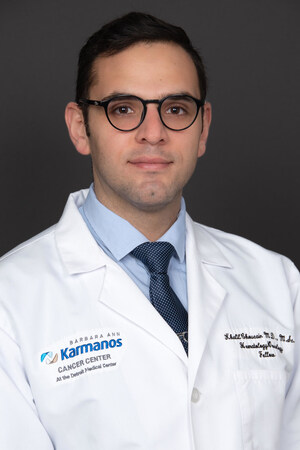
DETROIT, June 7, 2017 /PRNewswire-USNewswire/ -- Findings from a 10-year, world-wide study – The IDEA International Duration Evaluation of Adjuvant Chemotherapy Collaboration – involving 12,834 stage 3 colon cancer patients on adjuvant chemotherapy showed that patients with a lower risk of cancer recurrence who received three months of chemotherapy verses the standard six months of treatment, did just as well. The findings (abstract LBA1) were presented at the 2017 American Society of Clinical Oncology (ASCO) Annual Meeting held this week. Anthony F. Shields, M.D., Ph.D., associate center director, Clinical Sciences, at the Barbara Ann Karmanos Cancer Institute in Detroit, Mich., and professor, department of Oncology, at Wayne State University School of Medicine, was co-chair of the North American study. Study findings could change the standard of treatment for many stage 3 colon cancer patients.
"Anytime scientists can lower the toxicity for cancer patients and still get the intended results from the treatment, it's exciting news," said Dr. Shields. "For some stage 3 colon cancer patients, six months of chemotherapy will still be the recommendation. However, based on study findings, we estimate that for about 60 percent of patients with low-risk colon cancer, representing approximately 20,000 patients annually in the United States and 400,000 annually worldwide, the same benefits can be achieved with three months of treatment instead of six months, decreasing the side effects and risks, such as nerve damage, that can be attributed to continued chemotherapy."
About the Study
The IDEA collaboration began in 2007 and is, to-date, the largest colon cancer study of its kind. The study enrolled 12,834 stage 3 colon cancer patients in six phase 3 trials concurrently world-wide in North America, Europe and Asia, representing 12 countries in total. Senior study author was Axel Grothey, M.D., oncologist from Mayo Clinic Cancer Center in Rochester, Minn. Co-chairing the North American study with Dr. Shields was Jeffrey Meyerhardt, M.D., MPH, of Dana-Farber Cancer Institute and Harvard Medical School in Boston, Mass. A full list of study authors is in the abstract LBA1.
The study followed patients for a median of 39 months after surgery for stage 3 lymph node–positive colon cancer. Since 2004, the standard (adjuvant) treatment after surgery has been a combination of chemotherapies (FOLFOX or CAPOX), given over a period of six months. In this study, the patients who were on a three month treatment were associated with a less than one percent lower risk of recurrence compared with a six month treatment course as measured by the three-year disease-free survival rate (74.6% verses 75.5%). In a subset of patients categorized as low risk of cancer recurrence (cancer spread to one to three lymph nodes and not completely through the bowel wall), there was almost no disease-free survival difference between a three month versus six month course of therapy (83.1% verses 83.3%).
Next Steps
Dr. Shields and the other scientists involved in the IDEA collaboration are in the process of writing the study results in a paper with the goal of having it peered reviewed and formally published.
"We also plan to have the results incorporated into the pathways recommended by our individual cancer centers and organizations," added Dr. Shields.
"Physicians who treat patients with stage 3 colon cancer can discuss study results with their patients now to see if decreasing the length of chemotherapy to three months, or stopping treatments early depending on the treatment schedule, would be appropriate based on the patient's profile and risk.
"To be able to offer thousands of stage 3 colon cancer patients with less chemotherapy and still get the desired outcome, will be welcome news for many patients and their loved ones."
Karmanos Cancer Institute has more than 300 clinical trials open at any given time. To learn more about cancer treatments or other cancer services, visit www.karmanos.org or call 1-800-KARMANOS (1-800-527-6266.)
About the Barbara Ann Karmanos Cancer Institute
Located in mid-town Detroit, Michigan, the Barbara Ann Karmanos Cancer Institute, a subsidiary of McLaren Health Care, is one of 48 National Cancer Institute-designated comprehensive cancer centers in the United States. Karmanos is among the nation's best cancer centers. Through the commitment of 1,000 staff, including nearly 300 physicians and researchers on faculty at the Wayne State University School of Medicine, and supported by thousands of volunteer and financial donors, Karmanos strives to prevent, detect and eradicate all forms of cancer. Its long-term partnership with the WSU School of Medicine enhances the collaboration of critical research and academics related to cancer care. Gerold Bepler, M.D., Ph.D., is the Institute's president and chief executive officer. For more information call 1-800-KARMANOS or go to www.karmanos.org.
SOURCE Karmanos Cancer Institute







Share this article